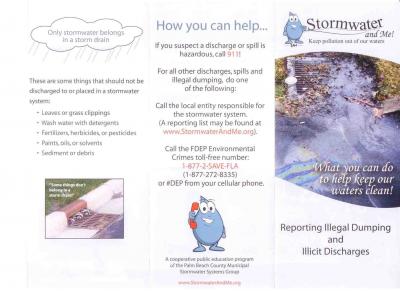Stormwater
Stormwater Regulation
The National Pollutant Discharge Elimination System (NPDES) Stormwater Program regulates point source discharges from three potential sources: Municipal Separate Storm Sewer Systems (MS4s), construction activities and industrial activities. The NPDES Stormwater Program in Tallahassee is responsible for the development, administration and compliance of rules and policy to minimize and prevent pollutants in stormwater discharges. Operators of these sources may be required to obtain an NPDES permit before they can discharge stormwater.
Stormwater runoff is generated from rain events that flow over land or impervious surfaces, such as paved streets, parking lots and building rooftops, and does not soak into the ground. The runoff picks up pollutants like trash, chemicals, oils, and dirt/sediment that can harm our rivers, streams and lakes. To protect these resources, municipalities, construction and industries activities, and others use stormwater controls, known as Best Management Practices (BMPs), to manage their runoff. The implementation of these practices, which include BMP design, performance and adaptive management requirements, prevent pollution by controlling it at its source.
What is an Illicit Discharge?
An Illicit discharge is defined as "any discharge into a municipal storm sewer system that is not composed entirely of stormwater". Some of the pollutants that fall into this category are:
- Car wash wastewater
- Gas and motor oil
- Grass clippings
- Household cleansers
- Paints
- Pesticides
- Pet waste
- Solvents
- Weed killer
Sometimes these pollutants are carried through the storm drainage system by rain, wind, or improper disposal into Howey water ways. This can result in serious health and water quality problems. In addition, wildlife and the overall appearance of water ways are adversely affected by illicit discharges.
Six Easy Ways That You Can Keep Illicit Discharges Out of Howey Waters
There are simple steps that we can take to solve the problems that the Howey water ways face. It is up to YOU, the homeowner and business owners who call Howey home, to clean it up and to help keep it clean!
- Used Oil, antifreeze, and batteries can be recycled. Clean up any spills immediately - kitty litter or sawdust will absorb the spill. Be sure to sweep these up as well.
- Wash your car on the grass so that the water, detergent and dirt will be filtered by the soil. Better yet, take your car to a commercial car wash, where your dirty water is sent to the wastewater treatment plant.
- Empty bottles of household cleansers, pesticides and weed killer should be disposed of according to label directions.
- Grass clippings in the street should be swept up after each mowing. Grass clippings left in the street are being washed down into the storm sewers and end up in Howey water ways where they have the potential to cause algae blooms.
- Many household products, including paints, paint thinners and solvents can be taken to Lake County Household Material Collection Facility. Paint brushes used with water-based paint can be rinsed in the sink. If you have a small amount of leftover paint in a can, stuff it loosely with newspaper, let the paint dry out completely and put it in the trash.
- When walking your pet use a bag or a scooper to clean up your pet's waste. In order to keep animal waste from contaminating our community, anyone who walks a pet should properly dispose of waste by picking it up, wrapping it and either placing it into the trash or flushing it UNWRAPPED!
Reporting of Illegal Dumping or Suspicious Discharges:
Reporting will, in great part, rely on participation from the public. Residents who observe illegal dumping or observe pollutants within waterways or storm sewers should contact the Town Hall at 352-324-2290 to report a stormwater violation. This program cannot succeed without strong public participation.
MUNICIPAL STORMWATER SYSTEM
A municipal separate storm sewer system (MS4) is a publicly-owned conveyance or system of conveyances (i.e., ditches, curbs, catch basins, underground pipes, etc.) designed or used for collecting or conveying stormwater and that discharges to surface waters of the state. Examples of MS4 operators include, but are not limited to, municipalities, counties, community development districts, universities, military bases or federal correctional facilities.
Operators of large, medium and regulated small MS4s are required to obtain NPDES permit coverage to discharge to waters of the state.
As implemented by Chapter 62-624, F.A.C., Phase I addresses discharges of stormwater runoff from "medium" and "large" MS4s (i.e., those MS4s located in areas with populations of 100,000 or greater). Under Phase II, the program regulates discharges from certain MS4s not regulated under Phase I, and that meet designation criteria set forth in Chapter 62-624, F.A.C.
LAWS AND RULES
Florida Statutes - Environmental Control Chapter 403
EPA - Summary of the Clean Water Act
Water Quality Standards Program
IF YOU WISH TO FILE A COMPLAINT OR HAVE QUESTIONS REGARDING ILLICIT DISCHARGE PLEASE EMAIL MCATES@HOWEY.ORG

